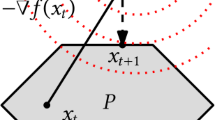Abstract
While the least absolute shrinkage and selection operator (LASSO) became a popular method due to its wide applications in high dimensional settings, some generalized LASSO models were developed. The sparse group LASSO is one of the important lasso-type methods, which aims to solve the linear regression problems with grouped covariates and tends to produce a solution with sparse effects both on a group and within group level. At the same time, we know that the least absolute deviation (LAD) is a useful and robust method when the noise distribution may be heavy-tailed or heterogeneous. In this paper, we combine these two classical ideas together to develop sparse group LAD model. We show that the sparse group LAD estimator achieves near oracle performance, i.e., with high probability, the \(L_2\) norm of the estimation error is of order \(O(\sqrt{k\text{ log }p/n}).\) Moreover, with the help of the linearization technique we propose the linearized alternating direction method of multipliers to solve the sparse group LAD estimator and establish its convergence. Numerical experiments are reported to illustrate the efficiency of the proposed algorithm.




Similar content being viewed by others
References
Candés, E.J.: Compressive sampling. Proc. Int. Congr. Math. 3, 1433–1452 (2006)
Candés, E.J., Tao, T.: Decoding by linear programming. IEEE Trans. Inf. Theory 51, 4203–4215 (2005)
Cai, T., Wang, L., Xu, G.: Shifting inequality and recovery of sparse signals. IEEE Trans. Signal Process. 58, 1300–1308 (2010)
Foygel, R., Drton, M.: Exact block-wise optimization in group Lasso and sparse group Lasso for linear regression (2010). arXiv:1010.3320
Friedman, J., Hastie, T., Tibshirani, R.: A note on the group lasso and a sparse group lasso (2010). arXiv:1001.0736
Li, X.X., Mo, L.L., Yuan, X.M., Zhang, J.Z.: Linearized alternating direction method of multipliers for sparse group and fused LASSO models. Comput. Stat. Data. Anal. 79, 203–221 (2014)
Tibshirani, R.: Regression shrinkage and selection via the LASSO. J. R. Stat. Soc. Ser. B Stat. 58(1), 267–288 (1996)
Simon, N., Friedman, J., Hastie, T., Tibshirani, R.: A sparse-group Lasso. J. Comput. Graph. Stat. 22(2), 231–245 (2013)
Wang, L.: The \(L_1\) penalized LAD estimator for high dimensional linear regression. J. Multivar. Anal. 120, 135–151 (2013)
Yuan, M., Lin, Y.: Model selection and estimation in regression with grouped variables. J. R. Stat. Soc. Ser. B Stat. Methodol 68, 49–76 (2006)
Acknowledgements
We would like to thank the two anonymous referees for their very constructive suggestions and comments. The work was supported in part by National Natural Science Foundation of China (11671029) and the Fundamental Research Funds for the central universities (2017JBM323).
Author information
Authors and Affiliations
Corresponding author
Rights and permissions
About this article
Cite this article
Wang, H., Kong, L. & Tao, J. The linearized alternating direction method of multipliers for sparse group LAD model. Optim Lett 13, 505–525 (2019). https://doi.org/10.1007/s11590-017-1180-3
Received:
Accepted:
Published:
Issue Date:
DOI: https://doi.org/10.1007/s11590-017-1180-3




